MSN Online Degrees
Overview

Bravely move forward in your nursing career today
- Access coursework 100% online with no campus visits required.
- Apply with no GMAT, GRE, or statistics needed.
- Choose from five concentrations.
- Complete clinicals locally in your preferred setting.
- Get started quickly with no waiting list once you’re accepted.
- Choose the part-time or full-time option, and earn your MSN degree in as few as 20 months.

Nurse leaders are shaping the future of healthcare
Take this opportunity to gain a whole new leadership perspective focused on compassion, preventive care, and evidence-based decision-making, and advance your career and salary potential at a time when nurse practitioner is one of the fastest-growing careers in the U.S.

Benefits of online MSN degrees
Earning an MSN from Maryville can help you gain the skills and knowledge you need to bravely move forward from where you are today.
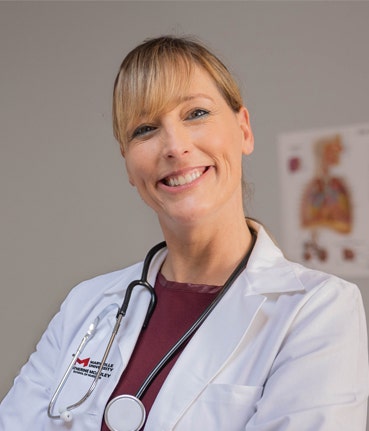
Why choose one of Maryville’s online MSN programs?
- Enjoy a flexible and convenient 24/7 online learning model.
- Complete your MSN in approximately two years.
- Gain immediately actionable knowledge in online classrooms and clinicals.
- Learn from faculty members with hands-on clinical expertise who teach nursing from experience.
- Receive student-centered support to become a successful nurse practitioner.
- Study with a university that embodies the values of caring, collaboration, and excellence.
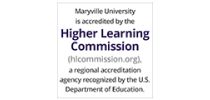
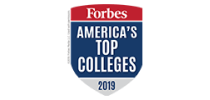
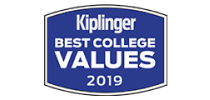
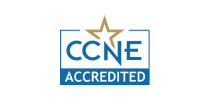
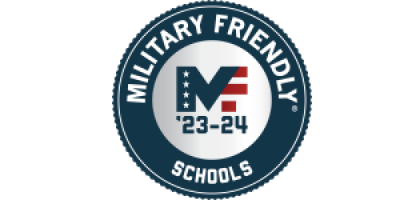
Maryville University is also recognized as one of the best online nursing school master’s programs for 2023 by The Princeton Review and one of the best online master’s in nursing programs by U.S. News & World Report.
Important dates for 2026
Program Details

Take charge of your career with your choice of five online MSN-NP programs

Five ways to specialize your MSN online degree
- Master of Science in Nursing (MSN) Adult-Gerontology Acute Care Nurse Practitioner (AGACNP)
- Master of Science in Nursing (MSN) Adult-Gerontology Primary Care Nurse Practitioner (AGPCNP)
- Master of Science in Nursing (MSN) Family Nurse Practitioner (FNP)
- Master of Science in Nursing (MSN) Psychiatric Mental Health Nurse Practitioner (PMHNP)
- Master of Science in Nursing (MSN) Pediatric Nurse Practitioner (PNP)

Adult-Gerontology Acute Care NP

Adult-Gerontology Primary Care NP
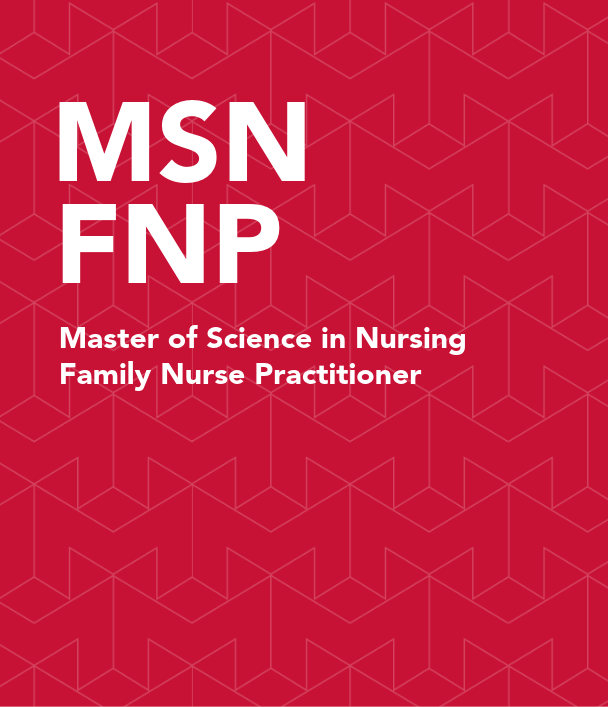
Family NP
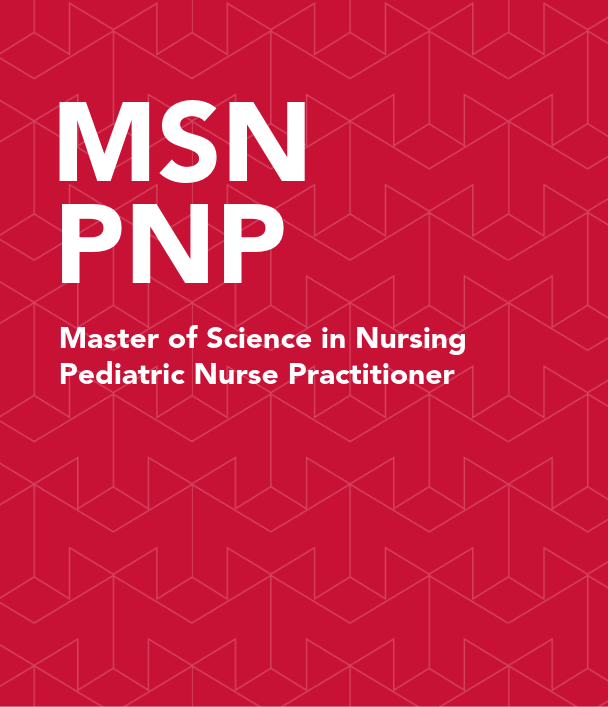
Pediatric NP
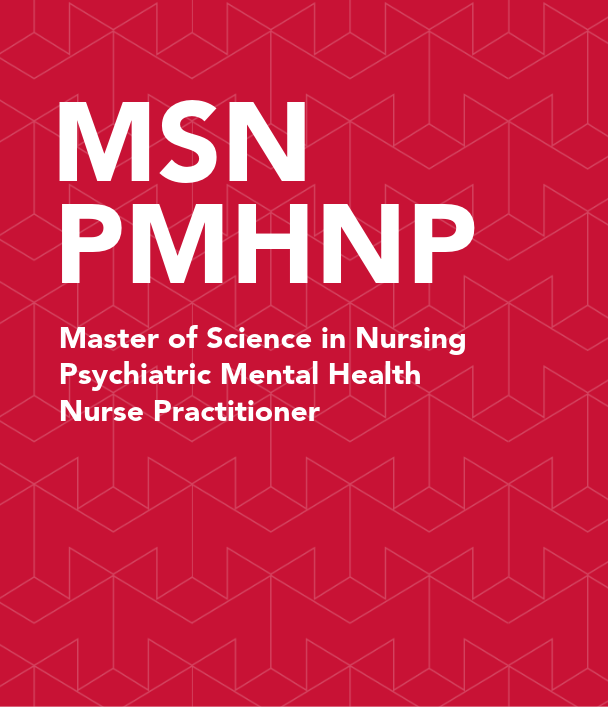
Psychiatric Mental Health NP
Careers

What can you do with your online MSN degree?
Because of factors like ongoing legislative reforms, an aging population, the proliferation of unhealthy lifestyle habits, and the rise of chronic illnesses, the demand for well-educated nurse practitioners shows no signs of slowing down. We’ll help you prepare for new career opportunities.

How much can you earn with your online MSN degree?
- RNs who earn their MSN and become nurse practitioners make, on average, $35,000 more than RNs, according to the U.S. Bureau of Labor Statistics (BLS).
- The median annual pay for nurse practitioners was $129,210 in 2024, according to the BLS.
- Psychiatric NP, pediatric NP, family NP, and gerontological NP all are ranked among the 11 highest-paying nursing roles, according to Indeed.
- The ongoing shortage of NPs and primary care physicians means newly educated nurse practitioners have more opportunities than ever to make a difference, especially in underserved areas.

What are the career pathways for an online MSN graduate?
Earning one of Maryville’s online MSN degrees can qualify you for advanced practice nursing roles such as:
- Master of Science in Nursing (MSN) Adult-Gerontology Acute Care Nurse Practitioner (AGACNP)
- Master of Science in Nursing (MSN) Adult-Gerontology Primary Care Nurse Practitioner (AGPCNP)
- Master of Science in Nursing (MSN) Family Nurse Practitioner (FNP)
- Master of Science in Nursing (MSN) Psychiatric Mental Health Nurse Practitioner (PMHNP)
- Master of Science in Nursing (MSN) Pediatric Nurse Practitioner (PNP)

Careers for graduates of MSN online degree programs
MSN-educated nurses can explore a wide range of career paths, giving them the opportunity to care for diverse patient populations or work in various healthcare settings. These opportunities include the following.

MSN career settings
Depending on specialization, MSN-educated nurse practitioners can find work across settings where healthcare professionals may be needed to treat people of all ages, demographics, and backgrounds. Some common work settings include the following.
- Hospitals and clinics
- Behavioral health clinics
- Community health centers
- In-home care
- Long-term care facilities
- Nursing research facilities
- Pediatric clinics
- Rehabilitation facilities
- Retirement homes
- Telehealth clinics

What is the typical salary for online MSN degree graduates?
Earning one of our MSN online degrees can lead you to a variety of well-paying nursing roles with median annual salaries* such as the following:
- Adult-Gerontology Primary Care Nurse Practitioner (AGPCNP): $108,000
- Family Nurse Practitioner (FNP): $105,000
- Pediatric Nurse Practitioner (PNP): $103,000
- Psychiatric Mental Health Nurse Practitioner (PMHNP): $123,000
- Clinical Research Specialist: $66,500
- Nursing Supervisor: $80,000

Online MSN degrees job outlook
The healthcare industry is in a near-constant state of growth, and the nursing profession is benefiting from that growth. Regardless of the area of nursing you pursue, you can expect a thriving, opportunity-rich job market when you graduate from one of our online accredited MSN programs:
- The U.S. Bureau of Labor Statistics projects jobs for nurse practitioners will increase by a tremendous 35% between 2024 and 2034.
- Strong growth is projected for adult-gerontology nurse practitioners as baby boomers age, according to the BLS.
- The BLS projects strong growth for family and pediatric nurse practitioners as demand for preventive care increases.
- Psychiatric mental health is the fastest-growing NP discipline, according to Advanced Practice Education Associates.

The changing workforce
With the influx of novice talent entering the workforce, healthcare organizations need nurse practitioners with the knowledge and skills to function autonomously more than ever.

The rewards of the profession
Job satisfaction among nurse practitioners is high due to factors such as the job’s work environment, work-life balance, and workload. Hiring organizations that wish to meet the growing demand for qualified, well-educated NPs will need to work hard to keep their workplaces inviting and rewarding.

The new model of healthcare

Nurse practitioner: The preferred caregiver
Earn an education with a strong ROI
We’re proud to be recognized among the leaders in social mobility in our region*:
- No. 1 in social mobility among private colleges and universities in the St. Louis area
- No. 1 in lowest average debt among regional private peers
- Top 3 in St. Louis for graduation rates and early-career earnings
These rankings serve as indicators of strong ROI for our graduates — meaning your Maryville education can help you start faster and go further.
Support from application through graduation
Advancing in nursing or specializing in a new practice area is a big undertaking. We offer the support and resources to help you earn your education on your terms and your schedule. It’s part of why our NP grads see better-than-average certification pass rates across disciplines.
Hear from 2025 online nursing grad Miranda Njance why Maryville is “the place to be” for pursuing NP education and certification.
Curriculum
We designed our program with flexibility in mind to fit your busy schedule. Coursework is 100% online, and you can choose from part-time and full-time schedule options. Learners who choose the full-time option can finish the program in as few as 20 months, and part-time students generally finish in 28-32 months. Clinical and practicum requirements can be completed locally where it’s convenient for you.
Online MSN: Credits by concentration
The length of your online MSN will vary slightly depending on the NP concentration you choose. The total number of credit hours for each concentration are as follows.
- Adult-Gerontology Acute Care NP: 47 credit hours
- Adult-Gerontology Primary Care NP: 47 credit hours
- Family NP: 47 credit hours
- Pediatric NP: 47 credit hours
- Psychiatric Mental Health NP: 50 credit hours
This course explores focused and comprehensive health assessments in a variety of settings and patients across the lifespan. This includes development of health promotion strategies and prioritization of care.
Prerequisite: Online - NURS 611, NURS 615
Corequisite: On Ground - NURS 615
This course focuses on the pharmacological foundation for safely prescribing medical regimens of illnesses for individuals across the lifespan. Also included are illness prevention, non-pharmacological and legal implications for prescriptive authority for the nurse practitioner.
Note: Selection of appropriate therapies, patient education and evaluation parameters are stressed.
AGACNP Concentration Curriculum
This is the first didactic management course in the Adult Gerontology Acute Care Nurse Practitioner program. Focus is on individuals experiencing illness seen in the acute care setting. Students will analyze practice guidelines and develop differential diagnoses, implement clinical judgment and decision-making, as it relates to evidence based care management.
Prerequisite: NURS 611, NURS 612, and NURS 615
Corequisite: NURS 641 or NURS 641C
First practicum course in the Adult Gerontology Acute Care Nurse Practitioner (AGACNP) program. Students will apply and integrate concepts presented in NURS-640 with focus on applying knowledge and skills in acute care practice settings.
Prerequisite: NURS 611, NURS 612, and NURS 615
Corequisite: NURS 640
This course is the second didactic management course in the Adult Gerontology Acute Care Nurse Practitioner program. Students will continue to expand on knowledge, decision making and management of acute and emergent physiological alterations in health. Students will analyze practice guidelines and develop differential diagnoses, implement clinical judgment and decision-making, as it relates to evidence based care management.
Prerequisite: NURS 640 and NURS 641 or NURS 641C
Corequisite: NURS 643 or NURS 643C
This is the second practicum course in the Adult Gerontology Acute Care Nurse Practitioner (AGACNP) program. Students will apply and integrate concepts presented in the NURS 642 with focus on comprehensive health care to complex, acute and critically ill patients in a clinical, preceptored practicum experience.
Prerequisite: NURS 640 and NURS 641
Corequisite: NURS 642
This is the final didactic management course in the Adult Gerontology Acute Care Nurse Practitioner (AGACNP) program. Students will continue to analyze practice guidelines and develop differential diagnoses, implement clinical judgment and decision-making, as it relates to evidence based care management in complex symptomology.
Prerequisite: NURS 640, NURS 641 or NURS 641C, NURS 642 and NURS 643 or NURS 643C
Corequisite: NURS 645 or NURS 645C
This is the final practicum course in the Adult Gerontology Acute Care Nurse Practitioner (AGACNP) program. The student will apply and integrate concepts presented in the NURS-644 with focus on comprehensive health care to complex, acute and critically ill patients in a clinical, preceptored practicum experience.
Prerequisite: NURS 642 and NURS 643
Corequisite: NURS 644
AGPCNP Concentration Curriculum
This course covers the care of adults experiencing acute, chronic and complex health problems of select body systems in this first of two sequential courses. Current research based interventions are analyzed. Individual, family, and group counseling/education for patients and families are incorporated. Included is primary, secondary and tertiary disease prevention and management of complex symptomatology.
Prerequisite: NURS 611, NURS 612, and NURS 615
Corequisite: NURS 621 or NURS 621C
This course will cover the theoretical, clinical and role components of care by an advanced practice nurse and are integrated in a supervised clinical practicum.
Prerequisite: NURS 611, NURS 612, and NURS 615
Corequisite: NURS 620
This course covers the care of adults experiencing acute, chronic and complex health problems of select body systems in this second of two sequential courses. Current research based interventions are analyzed. Individual, family, and group counseling/education for patients and families are incorporated. Included is primary, secondary and tertiary disease prevention and management of complex symptomatology.
Prerequisite: NURS 620 and NURS 621 or NURS 621C
Corequisite: NURS 624 or NURS 624C
This course will cover the theoretical, clinical and role components of care by an advanced practice provider and are integrated in a supervised clinical practicum. Opportunity is provided for the assessment, management, and evaluation of adults with chronic and acute health problems in a primary care setting.
Prerequisite: NURS 620 and NURS 621
Corequisite: NURS 623
The care of adults experiencing acute, chronic, and complex health problems are studied in this course specifically for students in the adult-gerontology nurse practitioner program. The course expands on current research-based interventions unique to adults of varying ages, from wellness to illness. Individual, family, group counseling, and education for patients and families are incorporated. Included is primary, secondary, and tertiary disease prevention and management of complex symptomatology.
Prerequisites: NURS 620, NURS 621, NURS 623, and NURS 624
Corequisite: NURS 627C
This course will cover the theoretical, clinical, and role components of care by an advanced practice nurse are integrated in a supervised clinical practicum. Opportunity is provided for the assessment, management, and evaluation of adults with chronic and acute health problems in a primary care setting.
Prerequisites: NURS 620, NURS 621C, NURS 623, and NURS 624
Corequisite: NURS 626
FNP Concentration Curriculum
This course covers the care of adults experiencing acute, chronic and complex health problems of select body systems in this first of two sequential courses. Current research based interventions are analyzed. Individual, family, and group counseling/education for patients and families are incorporated. Included is primary, secondary and tertiary disease prevention and management of complex symptomatology.
Prerequisite: NURS 611, NURS 612, and NURS 615
Corequisite: NURS 621 or NURS 621C
This course will cover the theoretical, clinical and role components of care by an advanced practice nurse and are integrated in a supervised clinical practicum.
Prerequisite: NURS 611, NURS 612, and NURS 615
Corequisite: NURS 620
This course covers the care of adults experiencing acute, chronic and complex health problems of select body systems in this second of two sequential courses. Current research based interventions are analyzed. Individual, family, and group counseling/education for patients and families are incorporated. Included is primary, secondary and tertiary disease prevention and management of complex symptomatology.
Prerequisite: NURS 620 and NURS 621 or NURS 621C
Corequisite: NURS 624 or NURS 624C
This course will cover the theoretical, clinical and role components of care by an advanced practice provider and are integrated in a supervised clinical practicum. Opportunity is provided for the assessment, management, and evaluation of adults with chronic and acute health problems in a primary care setting.
Prerequisite: NURS 620 and NURS 621
Corequisite: NURS 623
This course prepares Family Nurse Practitioner students to develop expertise and assume responsibility for health promotion, maintenance, and management of chronic and acute illness of children and women’s health. Emphasis is placed on the child within the framework of the family.
Prerequisite: NURS 623 and NURS 624 or NURS 624C
Corequisite: NURS 630 or NURS 630C
This course provides the student with an opportunity to assume responsibility for the primary health care services of individuals and families under clinical supervision. The student is expected to assume increasing responsibility for planning and implementing therapeutic processes and for documenting and evaluating outcomes of care. The role of the FNP in health care promotion and management and collaboration with health professionals.
Prerequisite: NURS 623 and NURS 624
Corequisite: NURS 629
PNP Concentration Curriculum
This course focuses on growth and development and milestones of pediatric patients using theories and evidence based practice. Students will learn anticipatory guidance techniques, health promotion and illness prevention concepts within the pediatric population, incorporating individual, cultural, ethnic, and spiritual preferences.
Prerequisite: NURS 611, NURS 615 and NURS 612 (may also be taken concurrently)
Corequisite: NURS 655C
This course is the first in a two-part pediatric primary care didactic sequence. In this course students will focus on acute and chronic primary health care problems of children and adolescents.
Prerequisite: NURS 611, NURS 612, NURS 615 & NURS 650
Corequisite: NURS 652 or NURS 652C
This is the first practicum course in the Pediatric Nurse Practitioner (PNP) program. Students will apply and integrate concepts presented in the NURS-651 with focus on applying knowledge and skills in pediatric primary care practice settings.
Prerequisite: NURS 650
Corequisite: NURS 651
This course is second in a two-part pediatric primary care didactic sequence. In this course students will focus on acute and chronic primary health care problems of children and adolescents.
Prerequisite: NURS 651 and NURS 652 or NURS 652C
Corequisite: NURS 654 or NURS 654C
This is the second practicum course in the Pediatric Nurse Practitioner (PNP) program. Students will apply and integrate concepts presented in the NURS 653 with focus on applying knowledge and skills in pediatric primary care practice settings.
Prerequisite: NURS 651 and NURS 652
Corequisite: NURS 653
This practicum course in the Pediatric Nurse Practitioner (PNP) program focuses on the primary care setting and the preventative well child visit. Students will apply and integrate concepts presented in the NURS 650 course with a focus on applying knowledge and skills in pediatric primary care practice settings around pediatric health promotion.
Prerequisite: NURS 612
Corequisite: NURS 650C
PMHNP Concentration Curriculum
This course will cover assessment and identification of discrete aspects of cognition, psychopathology, affect and behavior in the diagnosis and treatment planning of psychiatric illness across the life span. Also included is the appropriate use, monitoring and evaluation of prescribing psychotropic medication, including pharmacokinetics and pharmacodynamics.
Prerequisite: NURS 611, NURS 612 and NURS 615
In this course theories and models will be used to develop an understanding of the etiologies of acute and chronic mental health disorders among adults and older adults. Selection of appropriate treatment strategies including individual and group psychotherapies will be discussed.
Prerequisite:NURS 660
Corequisite: NURS 662 or NURS 662C
This practicum course is designed to synthesize advanced practice knowledge relevant to adult and older adult patients with psychiatric illness. A variety of psychotherapeutic strategies will be explored.
Prerequisite: NURS 660
Corequisite: NURS 661
This is the first of two didactic courses designed to assist the student in development of the advanced practice nursing role with the care and management of individuals with a mental health disorder across the lifespan.
Prerequisite: NURS 661 and NURS 662 or NURS 662C
Corequisite: NURS 664 or NURS 664C
This practicum is designed to synthesize advanced practice knowledge relevant to patients with psychiatric illness across the lifespan.
Prerequisite: NURS 661 and NURS 662
Corequisite: NURS 663
This is the second of two didactic courses designed to assist the student in development of the advanced practice nursing role with the care and management of individuals with a mental health disorder across the lifespan.
Prerequisite: NURS 663 and NURS 664 or NURS 664C
Corequisite: NURS 667 or NURS 667C
This practicum is designed to synthesize advanced practice knowledge relevant to patients with psychiatric illness across the lifespan.
Prerequisite: NURS 663 and NURS 664
Corequisite: NURS 665
To ensure the best possible educational experience for our students, we may update our curriculum to reflect emerging and changing employer and industry trends. Undergraduate programs and certificates are designed to be taken at a part-time pace. Please speak to your advisor for more details.
Professional licensure and certification regulations vary from jurisdiction to jurisdiction. Students are encouraged to visit the National Council of State Boards of Nursing for the state in which they intend to practice to verify specific licensure requirements which includes ensuring the program of interest meets the licensure requirements prior to enrolling. Students may visit the professional licensure page or reach out to our team of enrollment advisors for guidance.
Admission requirements

- BSN degree from a regionally accredited institution and CCNE/ACEN/CNEA accredited nursing program
- Cumulative GPA of 3.0 on a 4.0 scale in all college work
- At least one year of professional nursing experience
- Current, unencumbered licensure as an RN in the U.S.
- Official transcripts from every post-secondary school where a degree was earned and any graduate-level coursework
- Transfer credit request form

Admission notes
- Applicants who do not meet the minimum GPA requirement will be required to submit a personal statement explaining the low grades and outlining plans for improvement.
- The acceptance of transfer credit is at the discretion of Maryville University. View our transfer credit policy here.
- Maryville’s online MSN and BSN-DNP programs require students with an international education background to have their BSN from a CCNE/ACEN accredited program. Please reach out to an enrollment advisor for more information.
Interested in this degree?

University details
Founded in 1872 — top-rated today
Maryville University is proud to be recognized as one of America’s best colleges by U.S. News & World Report and Forbes.
At Maryville, we invite future nursing leaders to be brave and expand their potential. Let’s be brave together.
MSN online degrees: Meet our faculty
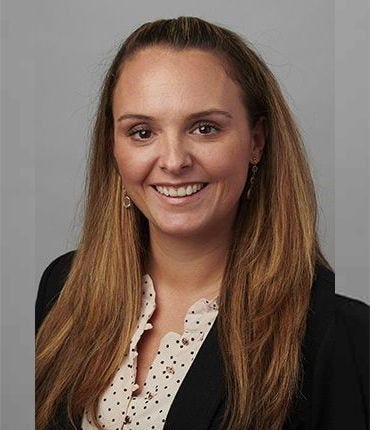
Mykale Elbe, DNP, APRN, FNP-BC
“At Maryville University, we are educating the future of nursing. Our graduates are tasked with serving patients with compassion, competency-based healthcare, and advocacy. Our faculty strives to ensure students are challenged to rise to the top, think critically, and be leaders in the profession. We hope to support our students in the fulfillment of their educational pursuits.
We’ve asked Mykale Elbe for her thoughts on the MSN online degrees. Here are her responses:

Why do you recommend Maryville’s online MSN degrees?

What are the most important skills employers are looking for?

What advice would you give to someone studying nursing?
Time management is essential to success as you continue in your educational endeavors toward advanced practice.
Communication is also key, as faculty members can’t know you need help unless you speak up. We’re here to help you learn. We want to know when you’re struggling, so we can find additional resources to support you.
Having passion — for your patients and yourself — is also important, as this is what drives us all to do what we love in nursing.

What is one area of nursing that you are most excited to teach about?
Frequently asked questions
Maryville MSN graduates gain the skills and knowledge they need to pursue a variety of advanced nursing roles. Earning your online master’s in nursing can prepare you for a nurse practitioner role in one of five distinct specialization areas or to pursue a specialized nursing role such as a forensic nurse or clinical research specialist role.
Find out more about career opportunities for MSN graduates.
In addition, Maryville University proudly holds regional accreditation from the Higher Learning Commission (HLC). Maryville has maintained accreditation from the HLC since 1941.
Graduating classes from Maryville’s MSN programs consistently beat national pass rate averages for certification exams across all disciplines.
Though your scope of practice may vary depending on your specialization and the state in which you practice, MSN-prepared nurses and nurse practitioners are gaining more autonomy to serve as primary care providers and perform many of the same duties that doctors do. As an NP, you can diagnose and treat illnesses, manage and prescribe medications, perform physical exams, order tests, and more.
The DNP, as a terminal degree, can take longer to complete and has more of a focus on nursing leadership, administration, and research. DNPs also can still practice patient care, and our DNP-NP program is designed to help nurses earn a terminal degree alongside preparing to become certified in their preferred NP practice area. Maryville’s online DNP-NP takes 36 months to complete, rather than the 20-32 for most of our MSN options.
It’s worth noting that you don’t need to earn your MSN before you pursue a DNP (although you can if you prefer). We offer a BSN to DNP program for BSN-prepared nurses who want to jump directly to earning their DNP on an accelerated timeline.
You can specialize your online MSN degree with one of five online nurse practitioner concentrations:
- Master of Science in Nursing (MSN) Adult-Gerontology Acute Care Nurse Practitioner (AGACNP)
- Master of Science in Nursing (MSN) Adult-Gerontology Primary Care Nurse Practitioner (AGPCNP)
- Master of Science in Nursing (MSN) Family Nurse Practitioner (FNP)
- Master of Science in Nursing (MSN) Psychiatric Mental Health Nurse Practitioner (PMHNP)
- Master of Science in Nursing (MSN) Pediatric Nurse Practitioner (PNP)
Online Master of Science in Nursing careers and resources


